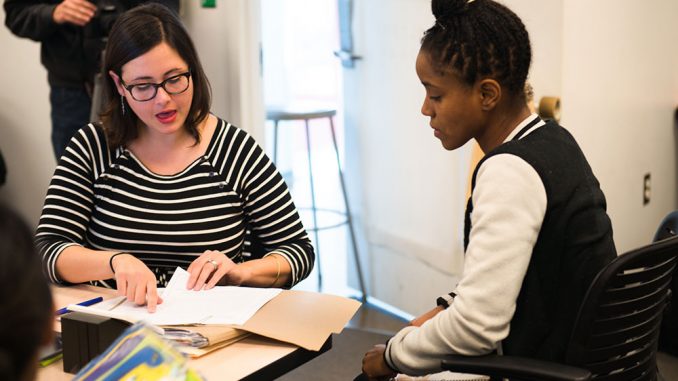
Despite the milestone of graduating from the university, breaking into the job market is often a daunting task, particularly for students in artistic fields.
Students in the Tyler School of Art have the opportunity to prepare for inevitable post-graduation networking through Artist Career Workshop, a class taught by Jennifer McTague.
The course helps students gather and showcase the skills they’ve developed in other classes such as printmaking and painting. The aspiring artists learn how to effectively present their work in the professional realm.
McTague took the class during her undergraduate at Tyler when it was taught by John Dowell.
“The course is designed to help give artists a professional edge for when they graduate,” McTague said. “While we go through steps that most Temple grads will have to deal with, like résumés and cover letters, we mostly focus on the career aspects unique to artists. The main project is a written proposal for students to get funding for their work or exhibition or artist residency.”
Although Artist Career Workshop is a requirement for printmaking and visual studies majors, students from other disciplines also have access to the course.
“We develop their artist statement,” McTague said. “We cover presenting their website in a professional matter, creating inventory of their artwork, determining how their taxes vary since most artists act as independent contractors. The most important skill is learning how to sell their work, so you know the linguistics for once you graduate and handle your art out on your own.”
Diane Cilino graduated from Tyler in 2011 with a BFA specializing in printmaking. While interning for six months at the Lower East Side Printshop in Manhattan, Cilino said her developed range of experience enabled her to procure various freelancing gigs.
“Although I haven’t settled into a job position that I have been wanting, I still apply the skills I’ve learned from [Artist Career Workshop] in promoting my work,” Cilino said. “I actually plan to go back to school for art therapy.”
By creating business cards, building portfolios and writing grants – all activities of focus in Artist Career Workshop – Cilino said she fostered an entrepreneurial spirit to compete in the creative marketplace.
“I learned not to be afraid to hype up your artwork for sales,” Cilino said. “I gained insight on how to survive as an artist in the economic world we live in. Most importantly, I learned not to push your lifestyle as an artist aside just to pay off your student loans while working an irrelevant job.”
As the founder of the nonprofit Second State Press – a communal printing workshop intended to enable artists to do their work without overcharging – located inside the Crane Arts Building, McTague said she relies upon her social and professional network throughout Philadelphia to maintain relevancy in the ever-changing landscape.
“Professional development isn’t a stagnant course, so it forces me to keep up to date with what’s the most current in the field,” McTague said. “When [Dowell] taught me, it was about how to get slides published and produced. Nowadays everything is digital.”
Bonnie Kissinger, a senior printmaking major, said the Artist Career Workshop puts the entire Tyler curriculum into perspective. Success in the job market depends on willingness to accept personal challenges and improve weaknesses, she said.
“I know that a lot of students in Tyler dread writing assignments and the thought of being a business professional, but it’s something we all have to face,” Kissinger said. “As a senior, I know that a lot of the resources I have at my fingertips will be gone in a matter of months, so I want to be as prepared as possible when I graduate. I recommend this course to those who don’t like writing, because it forces you to overcome those obstacles with the help of someone who knows what they’re doing.”
Considering Philadelphia’s vibrant arts scene, McTague said she realizes the significance of branching outside the classroom and allowing students to explore the cultural community.
“We take lots of field trips to different artist studios and arts organizations for students to broaden their network,” McTague said. “I still follow the same avenues I encourage my students to take, such as the Center for Emerging Visual Artists’ dialogue series where you can go and get professional development tips. It’s very inspiring for students to hear successful artist career stories.”
Angela Wang, a senior visual studies major, said she believes the demanding workload will benefit her and her fellow classmates’ careers in the not-too-distant future.
“It’s a lot of work, on top of driving yourself crazy in the studio,” Wang said. “Hearing experiences and gaining advice from the speakers helps. While it is exhibition-heavy, I think this class also teaches practical skills, such as preparing for interviews and writing résumés that are useful for any kind of career in the future.”
As a member of Tyler’s alumni board, McTague said she enjoys giving back to the institution that initially shaped her passion and skillset.
“It’s an honor for me to be back at one of the best art schools around,” McTague said. “You have to do this work anyway once you graduate, so you might as well do it in a supportive environment where you’re going to get a lot of critical feedback. Instead of a missed job opportunity, you will get a second chance to make an impression.”
John Corrigan can be reached at john.corrigan@temple.edu.



Be the first to comment